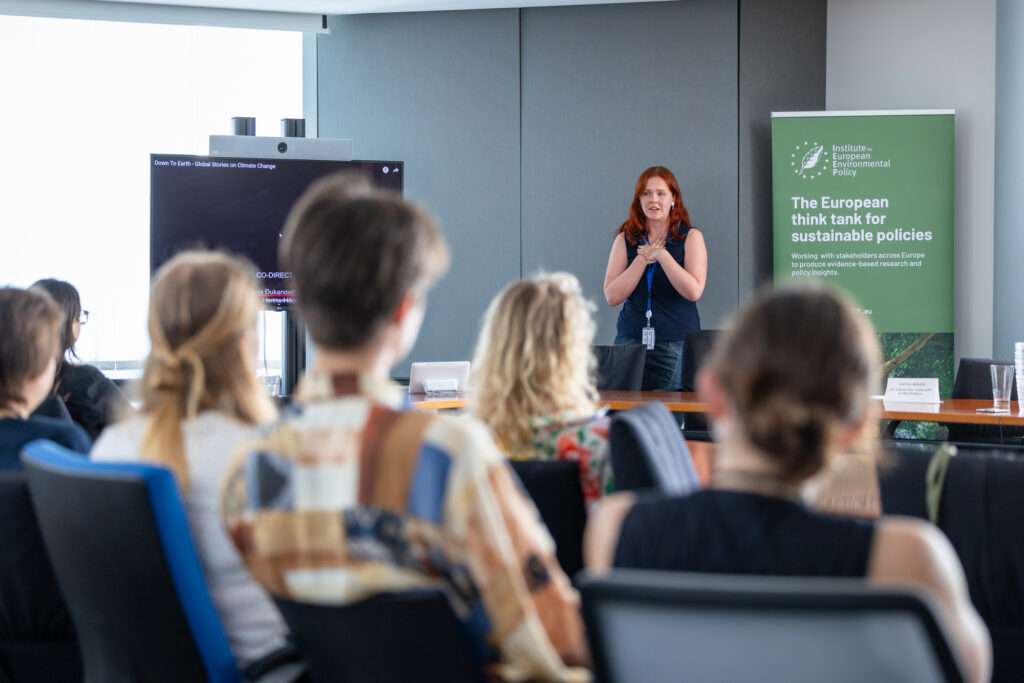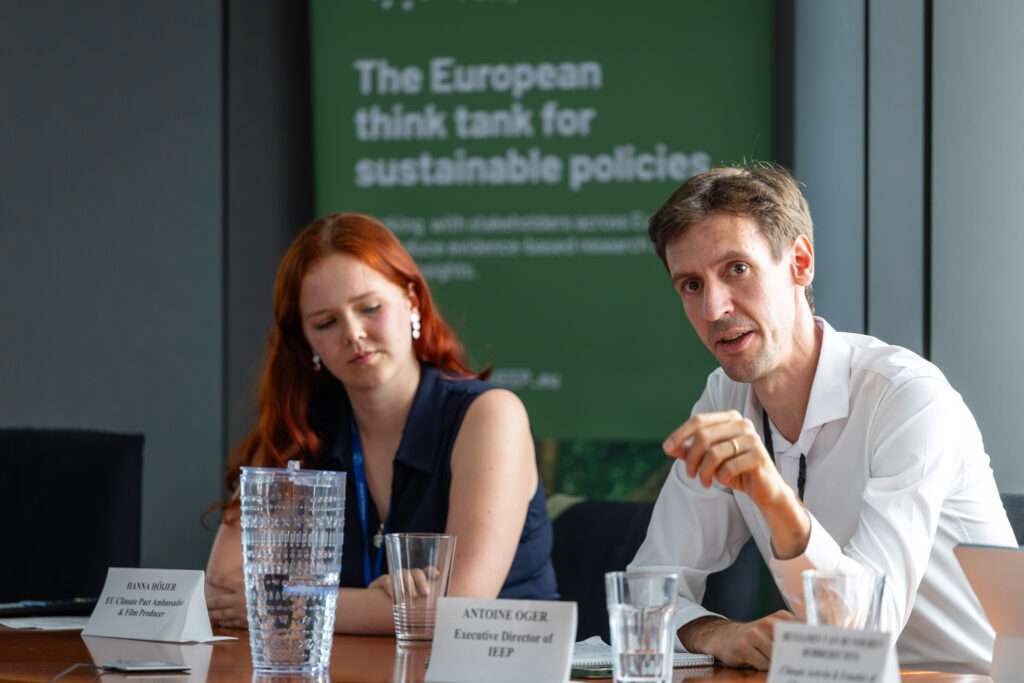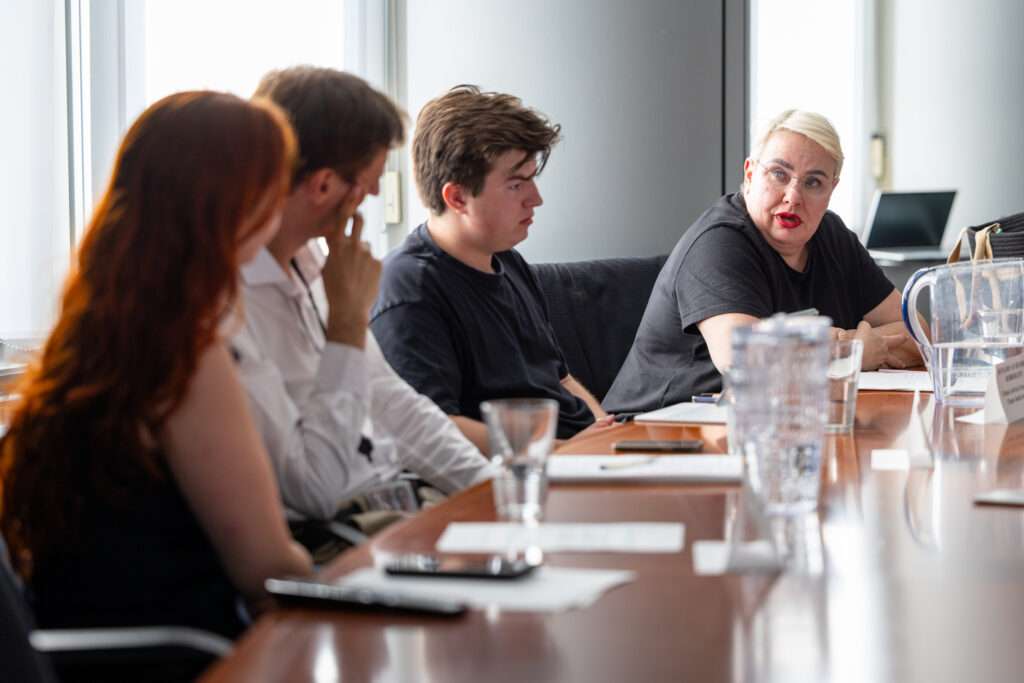Authors: Amalia Tuchmann, Irene Chiocchetti, Mattia Bonfanti, MEP Sirpa Pietikäinen (EPP), MEP Lara Wolters (S&D)
Environmental crisis should be treated as just as critical as other security issues, in line with the current focus of the European Commission – this was the message conveyed in a joint event co-organised with IEEP at the European Parliament. This summary, co-signed by MEP Pietikäinen (EPP) and MEP Wolters (S&D), includes some reflections and recommendations from the event.
On 1 July, together with MEP Sirpa Pietikäinen (EPP) and MEP Lara Wolters (S&D), the Institute for European Environmental Policy held an event at the European Parliament about the EU’s role in ensuring global climate justice. Prior to the dabate, a screening of the documentary “Down to Earth – Global Stories on Climate Change” produced by EU Climate Pact Ambassador Hanna Höijer, featured stories about the impacts of climate change from youth across the globe.

In the debate, IEEP Executive Director, Antoine Oger noted that social inequalities play a key role in the climate crisis because vulnerable households will have a harder time withstanding and adapting to its effects, and that this inequality should be a focus in policymaking. The EU is responsible for 6% of global emissions, so it has a large share of global responsibility. He also highlighted two main gaps in the current EU climate policy framework: 1) a lack of focus on adaptation measures, and 2) external impacts, with half of the EU’s greenhouse gas emissions being imported. Since external impacts are particularly difficult to monitor and measure, he recommended increasing data collection, as well as focusing on consumption patterns and demand-side measures.

Benjamin Van Bunderen Robberechts, founder of Climate Justice for Rosa, focused on the human impacts of the climate crisis, saying that “the climate crisis isn’t just about numbers and statistics – it is about people.”
He began by telling the story of his friend Rosa, who tragically passed away from a flood in Belgium in 2021, which was intensified by climate change, and which inspired him to become a climate activist as he is today. He went on to recommend that the EU pay for losses and damages from climate change, support third countries which are not responsible for climate change in adapting to it, enter into the fossil fuel non-proliferation treaty, stop criminalising climate activists, and officially recognise the victims of the climate crisis.
MEP Sirpa Pietikäinen noted that we have clarity on the current challenges and actions that must be taken, and that we have the financial means to solve this crisis by rechannelling the subsidies currently going to fossil fuels. She went on to give a list of actions that must be taken towards solving the climate crisis: ban the burning of fossil fuels, measure the social and environmental impacts from companies, use public procurement to only buy sustainable goods and services, and better educate citizens about the crisis. She finished her remarks with a motivational call to action: “We do not have the luxury of not acting. We need to act faster and much more radically.”

All three speakers agreed that the environmental crisis should be treated as just as critical as other security issues, in line with the current focus of the European Commission. They also emphasised that the so-called “simplification” agenda is a push for deregulation, which carries harmful consequences for environmental protection.
Key recommendations:
- Ensure the simplification agenda does not deregulate climate ambitions:
Safeguard against the risk that regulatory simplification leads to the weakening of environmental and climate policies. Instead, position environmental action as a driver of both security and economic competitiveness for the EU.
- Address external impacts and support global climate justice:
Tackle the external spillovers of EU green policies by supporting countries outside the EU, especially those least responsible for emissions but most affected by climate change. Provide assistance for their transitions and help them mitigate and adapt to climate impacts.
- Enhance data monitoring on consumption and demand:
Improve systems for monitoring and collecting data on consumption patterns and demand-side measures. This will contribute to emission reduction and be on track with progress toward climate goals.
- Reform economic incentives and redirect fossil fuel subsidies:
Overhaul economic and regulatory frameworks by phasing out subsidies for fossil fuels. Redirect these financial resources toward sustainable solutions and adaptation measures to accelerate the green transition. In addition, ensure that all public procurement purchases meet sustainability standards.
Pictures from the European Parliament
